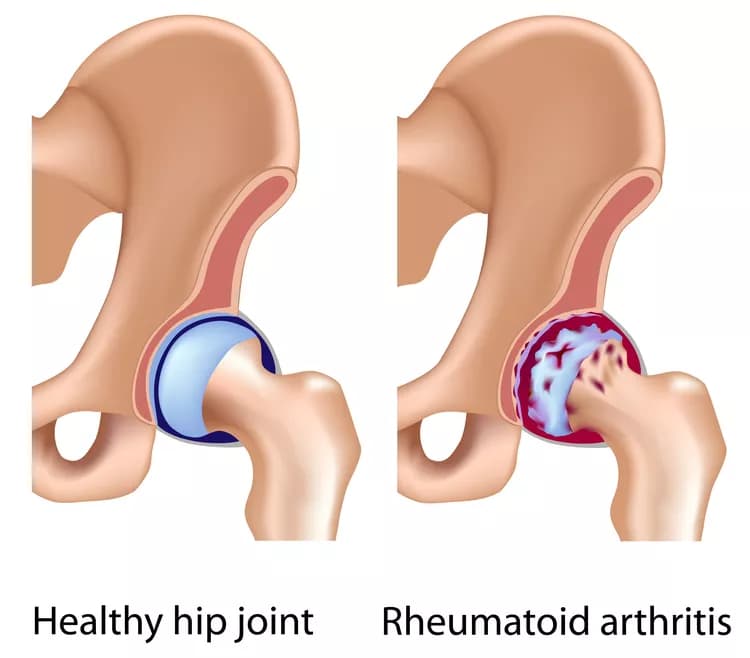
Rheumatoid Arthritis Linked To Increased Risk Of Death
Rheumatoid arthritis (RA) has been associated with increased risk of death in the past, but a new study by investigators from Brigham and Women's Hospital (BWH) brings that risk into sharper focus. Using data from the Nurses' Health Study, which has followed more than 100,000 female registered nurses since 1976, researchers found that rheumatoid arthritis significantly increased participants' overall risk of death, especially risk of death due to respiratory or cardiovascular causes. The new work suggests the importance of vigilance in monitoring respiratory and cardiovascular symptoms among patients with RA, particularly those who are seropositive.
"Previous studies have suggested that RA may be associated with increased mortality, but were not able to control for other variables, such as smoking, that affect both RA and mortality risks," said corresponding author Jeffrey Sparks, MD, MMSc, a physician in BWH's Division of Rheumatology, Immunology and Allergy. "Because the Nurses' Health Study is so large and has been following participants for so long, we were able to gather much more information about our subjects - we could follow them before and after diagnosis, take their health behaviors into account and determine specific causes of death. By doing so, we found strong evidence of increased risk for respiratory, cardiovascular and overall mortality for patients with RA."
Sparks and his colleagues evaluated 964 women in the Nurses' Health Study with RA and compared their mortality rates to women in the study without RA. The team controlled for other risk factors, including smoking, a known cause of worse respiratory and cardiovascular mortality, as well as age, body mass index, physical activity and diet among others. They found that RA was associated with a 40 percent increased risk of death. The research team followed up on each RA case where participants had died of respiratory causes. They found that many patients with RA died of chronic obstructive pulmonary disease (COPD).
"We finely adjusted for smoking in our analyses so what we're seeing appears to be due to something else," said Sparks.
The researchers then evaluated deaths from cancer, cardiovascular and respiratory causes. They found that RA was significantly associated with both cardiovascular and respiratory mortality, but not cancer mortality. The researchers also looked at differences between the two types of RA, "seropositive" and "seronegative." Patients with seropositive RA have auto-antibodies related to RA, and generally have more severe symptoms. The team found that participants with seropositive RA were at nearly three-fold increased risk of respiratory mortality compared to their counterparts who did not have RA. Seronegative RA, on the other hand, was not significantly associated with increased risk of respiratory mortality.
"We found that whether participants with RA were seropositive or seronegative really mattered - those who were seropositive were at higher risk, particularly for respiratory mortality," said Sparks.
Sparks notes that although most clinicians are aware of elevated cardiovascular disease risk among RA patients, the new study suggests the importance of monitoring respiratory symptoms, even among patients who are not smokers or have given up smoking.
"We hope that this study will encourage patients and clinicians to be more aware that patients with RA are at increased risk of both respiratory and cardiovascular mortality, particularly patients with seropositive RA," said Sparks.
Preclinical studies have also suggested a connection between the lungs and RA. Before patients present with joint pain and the classic symptoms of RA, some will present to clinic with anatomical lesions in their lungs without joint findings. Sparks and his colleagues are interested in better understanding how RA develops and if certain preclinical factors may help predict risk of RA and subsequent clinical outcomes, with the goal of improving screening and prevention.
The above post is a redistributed news release provided by the Brigham and Women's Hospital. Note: Materials may be edited for content and length.
Disclaimer: DoveMed is not responsible for the adapted accuracy of news releases posted to DoveMed by contributing universities and institutions.
Primary Resource:
Sparks, J. A., Chang, S. C., Liao, K. P., Lu, B., Fine, A. R., Solomon, D. H., ... & Karlson, E. W. (2015). Rheumatoid arthritis and mortality among women during 36 years of prospective follow‐up: Results from the Nurses' Health Study. Arthritis Care & Research.
Related Articles
Test Your Knowledge
Asked by users
Related Centers
Related Specialties
Related Physicians
Related Procedures
Related Resources
Join DoveHubs
and connect with fellow professionals

0 Comments
Please log in to post a comment.